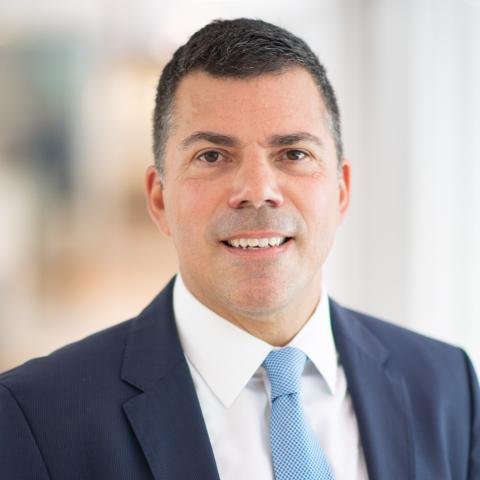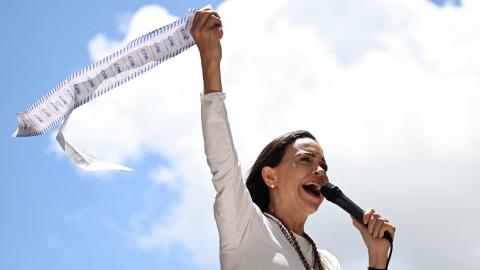María Corina Machado’s Nobel Peace Prize should have united Latin America in celebrating democratic resistance to authoritarianism. Instead, it exposed a deep ideological divide.
In its announcement, the Norwegian Nobel Committee described Machado as “one of the most extraordinary examples of civilian courage in Latin America in recent times,” noted her lifelong work for democracy in the face of the violent machinery of the Nicolás Maduro regime, and emphasized the inextricable link between democracy and peace. The Maduro regime is a destabilizing and destructive force in the region, and its continued rule is a stain on the region that all Latin Americans should want to see brought to an end.
Instead of universal acclaim, however, reactions from Latin America’s political leaders broke down along ideological lines, with leaders on the right exulting in the news and those on the left, with a few notable exceptions, choosing to ignore the achievement, criticize the Nobel Committee for politicizing the award, or castigate Machado for a range of offenses. The reaction highlights the extent to which ideological commitments have taken precedence over allegiance to democracy among many in the Latin American left.
While criticism from authoritarian leaders such as Cuba’s President Miguel Díaz-Canel was to be expected, the silence from democratically elected leaders is disappointing. Mexican President Claudia Sheinbaum, when asked about the award, avoided responding with a “no comment” and a canned reference to Mexico’s tradition of noninterference. Brazilian President Luiz Inácio Lula da Silva did not offer any comment either, and his adviser Celso Amorim criticized the Nobel Committee for a decision he said prioritized politics over peace.
Colombian President Gustavo Petro, after first posting a congratulatory but ambiguous message, fired off a series of questions to Machado regarding how her outreach to foreign leaders such as Benjamin Netanyahu could possibly lead to democracy in Venezuela and instead appealed for a national dialogue in Venezuela.
Notably, Bernardo Arévalo, the leftist president of Guatemala, wrote a congratulatory note to Machado on X, standing virtually alone among leftist leaders in acknowledging Machado.
There were muted responses from the leftist leaders of Uruguay and Chile, often considered bulwarks of democracy in the region. Yamandú Orsi of Uruguay declared that this would have been a good year for the award not to be given. And Chilean President Gabriel Boric said nothing on the matter, although his foreign minister congratulated Machado.
The reactions reveal how ideological commitments have supplanted democratic principles in the region. It is not that Machado should be beyond criticism. One can question her support for U.S. sanctions or the degree to which she has aligned herself with President Donald Trump, including support for the U.S. military buildup in the Caribbean Sea, without dismissing the significance and moral weight of her campaign.
And yes, Machado dedicated her prize to Trump, a calculated move to maintain support from the world’s most powerful democracy at a moment when regional leaders have abandoned her cause.
But the ease with which many on the left ignore or diminish Machado and her movement exposes the hollowness of their rhetoric about solidarity and democracy and their elevation of favored principles like sovereignty and noninterference above basic civil rights and democratic norms.
The contrast is striking. Leftist leaders scrutinize Machado’s support for sanctions and her alignment with Trump yet remain largely silent on Maduro’s imprisonment of nearly 2,000 dissidents after the July election, the systematic torture documented by human rights organizations or the regime’s transformation of Venezuela into a criminal state.
Brazil’s Lula even suggested in 2023 that democracy was “thriving” in Venezuela and criticized the “narrative of authoritarianism” against Maduro — this about a regime that has banned opposition candidates, shuttered independent media and forced 8 million people into exile.
For her part, Machado remains focused on building a democratic movement in Venezuela and laying the foundations for a return to democracy. She will likely continue to seek support wherever she can find it, and says governments must make a simple choice, whether “to be with the people of Venezuela or with a narco-terrorist cartel.”
Today’s fractured response to both Maduro’s electoral theft and Machado’s Nobel Prize reveals how much ideology currently divides Latin America, leaving Venezuelan democrats isolated and the region weakened. Until Latin American leaders can celebrate democratic courage regardless of its political coloring, they will remain unable to confront the authoritarian threats in their own hemisphere.
As the Nobel Committee noted, “freedom must never be taken for granted, but must always be defended — with words, with courage and with determination." These are precisely the qualities that are lacking among the region’s current leaders.


















